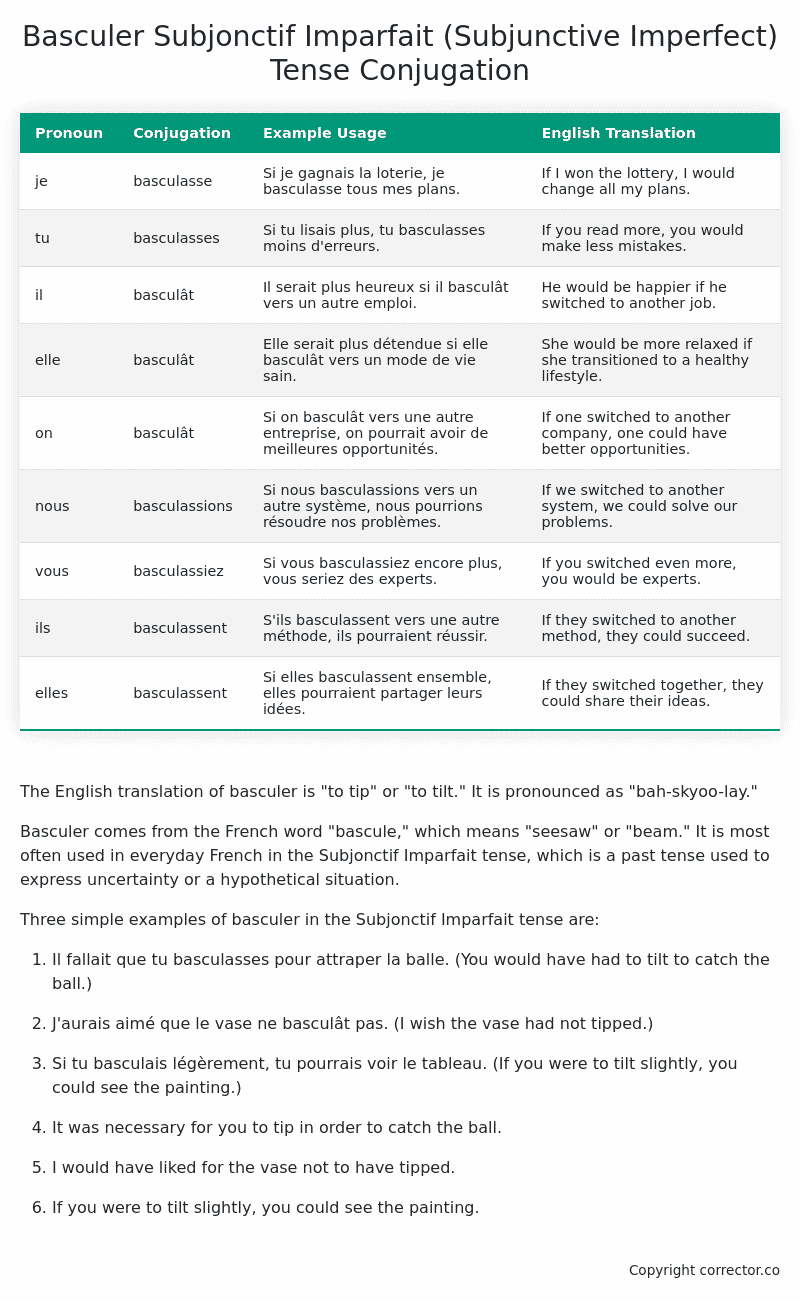Subjonctif Imparfait (Subjunctive Imperfect) Tense Conjugation of the French Verb basculer
Introduction to the verb basculer
The English translation of basculer is “to tip” or “to tilt.” It is pronounced as “bah-skyoo-lay.”
Basculer comes from the French word “bascule,” which means “seesaw” or “beam.” It is most often used in everyday French in the Subjonctif Imparfait tense, which is a past tense used to express uncertainty or a hypothetical situation.
Three simple examples of basculer in the Subjonctif Imparfait tense are:
-
Il fallait que tu basculasses pour attraper la balle. (You would have had to tilt to catch the ball.)
-
J’aurais aimé que le vase ne basculât pas. (I wish the vase had not tipped.)
-
Si tu basculais légèrement, tu pourrais voir le tableau. (If you were to tilt slightly, you could see the painting.)
-
It was necessary for you to tip in order to catch the ball.
-
I would have liked for the vase not to have tipped.
-
If you were to tilt slightly, you could see the painting.
Table of the Subjonctif Imparfait (Subjunctive Imperfect) Tense Conjugation of basculer
| Pronoun | Conjugation | Example Usage | English Translation |
|---|---|---|---|
| je | basculasse | Si je gagnais la loterie, je basculasse tous mes plans. | If I won the lottery, I would change all my plans. |
| tu | basculasses | Si tu lisais plus, tu basculasses moins d’erreurs. | If you read more, you would make less mistakes. |
| il | basculât | Il serait plus heureux si il basculât vers un autre emploi. | He would be happier if he switched to another job. |
| elle | basculât | Elle serait plus détendue si elle basculât vers un mode de vie sain. | She would be more relaxed if she transitioned to a healthy lifestyle. |
| on | basculât | Si on basculât vers une autre entreprise, on pourrait avoir de meilleures opportunités. | If one switched to another company, one could have better opportunities. |
| nous | basculassions | Si nous basculassions vers un autre système, nous pourrions résoudre nos problèmes. | If we switched to another system, we could solve our problems. |
| vous | basculassiez | Si vous basculassiez encore plus, vous seriez des experts. | If you switched even more, you would be experts. |
| ils | basculassent | S’ils basculassent vers une autre méthode, ils pourraient réussir. | If they switched to another method, they could succeed. |
| elles | basculassent | Si elles basculassent ensemble, elles pourraient partager leurs idées. | If they switched together, they could share their ideas. |
Other Conjugations for Basculer.
Le Present (Present Tense) Conjugation of the French Verb basculer
Imparfait (Imperfect) Tense Conjugation of the French Verb basculer
Passé Simple (Simple Past) Tense Conjugation of the French Verb basculer
Passé Composé (Present Perfect) Tense Conjugation of the French Verb basculer
Futur Simple (Simple Future) Tense Conjugation of the French Verb basculer
Futur Proche (Near Future) Tense Conjugation of the French Verb basculer
Plus-que-parfait (Pluperfect) Tense Conjugation of the French Verb basculer
Passé Antérieur (Past Anterior) Tense Conjugation of the French Verb basculer
Futur Antérieur (Future Anterior) Tense Conjugation of the French Verb basculer
Subjonctif Présent (Subjunctive Present) Tense Conjugation of the French Verb basculer
Subjonctif Passé (Subjunctive Past) Tense Conjugation of the French Verb basculer
Subjonctif Imparfait (Subjunctive Imperfect) Tense Conjugation of the French Verb basculer (this article)
Subjonctif Plus-que-parfait (Subjunctive Pluperfect) Tense Conjugation of the French Verb basculer
Conditionnel Présent (Conditional Present) Tense Conjugation of the French Verb basculer
Conditionnel Passé (Conditional Past) Tense Conjugation of the French Verb basculer
L’impératif Présent (Imperative Present) Tense Conjugation of the French Verb basculer
L’infinitif Présent (Infinitive Present) Tense Conjugation of the French Verb basculer
Struggling with French verbs or the language in general? Why not use our free French Grammar Checker – no registration required!
Get a FREE Download Study Sheet of this Conjugation 🔥
Simply right click the image below, click “save image” and get your free reference for the basculer Subjonctif Imparfait tense conjugation!

Basculer – About the French Subjonctif Imparfait (Subjunctive Imperfect) Tense
Formation
Common Everyday Usage Patterns
Interactions with Other Tenses
Subjonctif Présent
Indicatif Passé Composé
Conditional
Conditional Perfect
Summary
I hope you enjoyed this article on the verb basculer. Still in a learning mood? Check out another TOTALLY random French verb conjugation!


